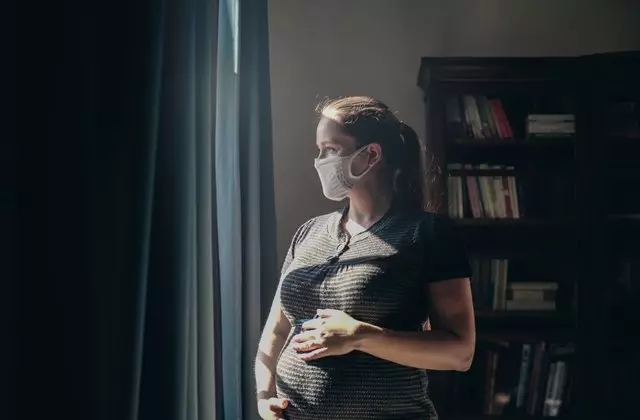
Coronavirus pandemic does not yet think to retreat, and more than a year after her origin, we are no longer a slicker who are surprised at the presence of COVID-19 in the surrounding world. At first, the news is that pregnant women are infected with coronavirus and give birth to children with antibodies to it, caused shock. Moreover, some studies have shown that in anticipation of the child, a woman is more at risk of developing heavy symptoms than the population as a whole. Also caused anxiety the lack of understanding of what is happening with the fruit, if the future mother is sick.
Doctors from the Children's Hospital Philadelphia and Medical School Perelman Pennsylvania University (USA) decided to explore the placenta of women infected with SARS-COV-2. "Antibodies of maternal origin is the key element of neonatal immunity. Understanding the dynamics of the response of maternal antibodies for an infection caused by coronavirus during pregnancy and their subsequent transplacental transfer of antibodies can help in monitoring the state of newborns, as well as in mothers vaccination strategies, "the authors of the work are written, the results of which are presented in Jama Pediatrics.
A cohort study was carried out at Pennsylvania hospital from April 9 to August 8, 2020. A total of 1714 birthdayrs 28-35 years old, of which 450 (26.3%) were black, 879 (51.3%) - White, 203 (11.8%) - Hispanic, 126 (7.3%) - asians , 56 more (3.3%) - representatives of another race. Blood samples managed to take a 1471 pair of a mother-child (some women gave birth to twins or twins).
"IgG and / or IgM antibodies to SARS-COV-2 We have found in 83 out of 1471 women (6%) during childbirth, and IgG (synthesized by the last, five or six after the pathogen ingress, retain information about it. - Note Ed.) Released in cord blood in 72 of 83 newborns (87%). Igm did not find any sample of umbilical blood, and antibodies were not detected by any child born from a seronegative mother (a seronegative period - a period of time from infection until antibodies that can be revealed using serological studies. - Approx. Ed .). Eleven babies born from seropositive mothers were sernegative: five of 11 (45%) were born from mothers only with IGM antibodies, and six of 11 (55%) - from mothers with significantly lower IGG concentrations compared to those that revealed Mothers of seropositive babies. The IGG concentrations in the cord blood correlated with concentrations of maternal IgG. The transfer coefficients through the placenta above 1.0 were observed among women with asymptomatic infection, as well as among the fever with light, moderate and severe COVID-19 forms. And they rose with an increase in the time interval between the beginning of infection in mothers and childbirth, "the doctors reported.
Thus, the concentrations of antibodies discovered in the placenta, as a rule, reflect the degree of infection of the mother and the period during which it is sick. In the placenta of the feminine, infected in the early periods of pregnancy, revealed more antibodies - apparently, did not matter, they had symptoms or not.
It also turned out that only class G antibodies can penetrate into placental blood, which is collected from the umbilical cord during its intersection during childbirth or cesarean sections. The fact that neither one of the babies in the study did not identify COVID-19 is a good sign, doctors consider, but still one cannot argue that the newborn can not be infected at all in the womb. As the authors of the work stressed, there is great concern about the risk of postnatal infection of newborns from mothers or other relatives.
Source: Naked Science
